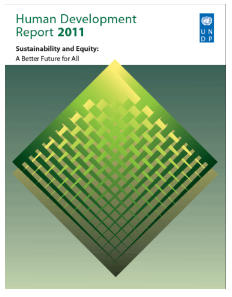The 2011 Human Development Report, titled "Sustainability and Equity: A Better Future for All,” focuses on how equitable access to renewable energy, health care, water and sanitation can advance both sustainability and human development.
The report notes that, despite impressive human development rankings in some of the Pacific Island countries, the region is threatened by rising sea-levels.
 3 November 2011: The 2011 Human Development Report, titled “Sustainability and Equity: A Better Future for All,” analyzes how equitable access to renewable energy, health care, water and sanitation can advance both sustainability and human development. It notes that, despite impressive human development rankings in some of the Pacific Island countries, the region is threatened by rising sea-levels, reduced fresh water sources and fish stocks.
3 November 2011: The 2011 Human Development Report, titled “Sustainability and Equity: A Better Future for All,” analyzes how equitable access to renewable energy, health care, water and sanitation can advance both sustainability and human development. It notes that, despite impressive human development rankings in some of the Pacific Island countries, the region is threatened by rising sea-levels, reduced fresh water sources and fish stocks.
The report’s key message is that equity and sustainability are inextricably linked; one cannot be achieved without the other. It notes that if bold action is not taken, environmental damage, including climate change effects, can slow or reverse development progress made in recent years. Climate change is expected to lead to major declines in fish stocks in the Pacific Islands. Additionally, the countries most vulnerable to these shifts are generally those most dependent on fish for livelihoods and exports.
This year’s report ranks 187 countries and territories based on the human development index (HDI), a composite index of income, life expectancy, and education indicators. The increase over the 169 countries covered in 2010 partially reflects improved data from small island States of the Caribbean and the Pacific. In the Pacific, the levels of human development across countries vary significantly. The majority of Pacific Island countries are classified in the medium human development category. The Federated States of Micronesia, Palau and Kiribati are featured for the first time in this year’s report. Palau and Tonga are part of the group of high human development countries.
The report highlights Papua New Guinea and Solomon Islands as having high rates of natural resource depletion. In Solomon Islands, forest coverage has decreased from 80% percent to 4.3% in the last two decades. In Papua New Guinea, the forest coverage has reduced from 64% to 8%. It also cites community management of natural resources in Fiji, the practice of traditional systems for seasonal fishing, and Vanuatu on the establishment of conservation sites. [Publication: Human Development Report 2011 Sustainability and Equity: A Better Future for All] [UNDP Press Release] [Address of UN Resident Representative for Fiji]